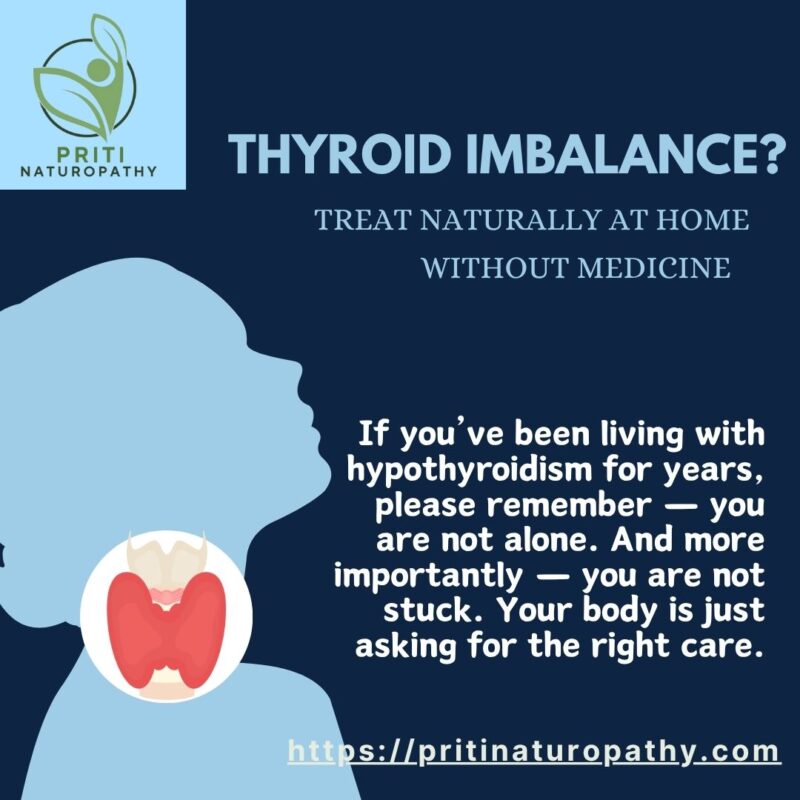Introduction
Many people feel tired all the time, gaining weight without any clear reason, facing hair fall, or experiencing mood swings. And most of the time, the root cause turns out to be the same — thyroid imbalance, especially hypothyroidism.
If you’ve been living with hypothyroidism for years, please remember — you are not alone. And more importantly — you are not stuck. Your body is just asking for the right care.
And the good news — you don’t have to depend on lifelong medication. With the right naturopathy approach, your thyroid can heal naturally. In this post, I’m sharing a complete natural treatment plan — the same one I share with my clients — using the power of food, herbs, yoga, and time-tested naturopathic therapies.
What Is Hypothyroidism?
Let’s start by understanding what hypothyroidism really is.
You have a small butterfly-shaped gland in your neck called the thyroid gland. It produces hormones that affect your energy levels, metabolism, weight, digestion, periods, skin, and even your mood.
Your thyroid mainly produces two hormones:
- T4 (Thyroxine) – the storage hormone
- T3 (Triiodothyronine) – the active hormone that does the actual work
Now here’s the key: your body needs to convert T4 into T3, otherwise your body won’t get the energy and balance it needs.
In hypothyroidism, this conversion slows down. Even if T4 is present, you might still feel symptoms like:
- Constant fatigue
- Weight gain
- Brain fog
Another important hormone is TSH (Thyroid Stimulating Hormone) — made by your brain. TSH tells your thyroid how much hormone to produce. In hypothyroidism:
- T3 and T4 levels go low
- TSH goes high — your brain is trying to push your thyroid to work harder
Sometimes people confuse hypothyroidism with goiter. A goiter means the gland is enlarged, but hypothyroidism means it’s not making enough hormones. They can happen together, but they’re not the same.
Common Symptoms of Hypothyroidism
These are common symptoms:
- Feeling tired or sleepy all day
- Gaining weight easily
- Hair fall
- Dry, dull skin
- Cold hands and feet
- Constipation
- Low mood or even depression
If these sound familiar, don’t worry — there’s a natural way to support your thyroid.
Root Causes of Hypothyroidism
Healing starts with understanding the cause. In most cases, it’s not just one thing, but a combination:
Autoimmune thyroiditis (Hashimoto’s) – your immune system attacks the thyroid
Iodine deficiency – your thyroid needs iodine to produce hormones
Poor gut health – affects absorption of minerals like selenium, zinc, iron, magnesium
Chronic stress – affects your adrenal and thyroid glands
Other factors:
- Hormonal changes (pregnancy, menopause)
- Certain medications
- Radiation or surgery near the neck
- Environmental toxins like fluoride, pesticides
This is why in naturopathy, we work on the whole system, not just the thyroid.
Three Minerals Your Thyroid Needs
Before we move to the treatment plan, let check the 3 key minerals your thyroid depends on:
1. Selenium – The Hormone Converter
This mineral helps to convert T4 to T3.
Sources: Pumpkin seeds, sunflower seeds, Brazil nuts (1–2 per day)
2. Zinc – The Communication Link
It helps your body use thyroid hormones and supports immunity.
Sources: Sesame seeds, lentils, legumes, whole grains (in moderation)
3. Magnesium – The Metabolism Booster
It supports hormone production, mood, and digestion.
Sources: Coconut water, bananas, almonds, cooked spinach, flaxseeds
Make sure these minerals are part of your daily diet through real food, not just supplements.
Complete Naturopathy Treatment Plan for Hypothyroidism
This plan is your naturopathy treatment plan, follow this plan for at least- weeks and you will start noticing the results.
Morning Routine
- Start your day with jeera-methi-ajwain boiled water
- Practice these yoga asanas (3 mins each):
• Sarvangasana (Shoulder Stand)
• Halasana (Plough Pose)
• Setu Bandhasana (Bridge Pose)
Breathing Exercises (2 mins each):
• Ujjayi pranayama
• Bhramari
• Anulom Vilom
- Post-yoga: Have one banana
- Do Hot & Cold Compression with Epsom Salt on the throat (3–4 rounds daily)
- Apply a Wet Mud Pack on the throat for 30 minutes
- If possible: Take lukewarm water enema 2–3 times/week to support gut health
Diet Tips
- Include millets (foxtail, barnyard, amaranth, quinoa) in meals
- Add seeds: pumpkin, sunflower, flax, sesame
- Drink coconut water with almonds in the evening
- After dinner: Take 1 tsp Trikatu powder for better digestion
- Before bed: Take 1 tbsp Ashwagandha root powder with water to reduce stress
Clients who followed this plan saw better energy, hormone balance, and weight loss within a month.
What to Avoid in Hypothyroidism
Healing is also about removing what blocks your progress. Here’s what you should avoid:
Raw cruciferous vegetables like broccoli, cabbage, cauliflower – they interfere with hormone production. Always steam or cook them.
Soy and soy products – they can disrupt hormones and block iodine.
Gluten (especially in Hashimoto’s) – may trigger inflammation.
Sugar and refined carbs – slow down your metabolism.
Caffeine on an empty stomach – increases stress hormones and affects absorption of thyroid medicine.
FAQS
Can I stop taking my medication if I try natural methods?
Naturopathy can go hand on hand with medicines, first start both then check your progress, if the thyroid goes down, then you can gradually reduce then stop the medicine.
What minerals are effective for thyroid support?
Selenium, zinc, magnesium are effective for thyroid.
What to avoid in Hypothyroidism?
You should avoid:
Raw cruciferous vegetables like broccoli, cabbage, cauliflower – they interfere with hormone production. Always steam or cook them.
Soy and soy products – they can disrupt hormones and block iodine.
Gluten (especially in Hashimoto’s) – may trigger inflammation.
Sugar and refined carbs – slow down your metabolism.
Caffeine on an empty stomach – increases stress hormones and affects absorption of thyroid medicine.
Watch Full Video – Fix Thyroid Naturally| No Medicine| Naturopathy Treatment Plan


Leave a Reply